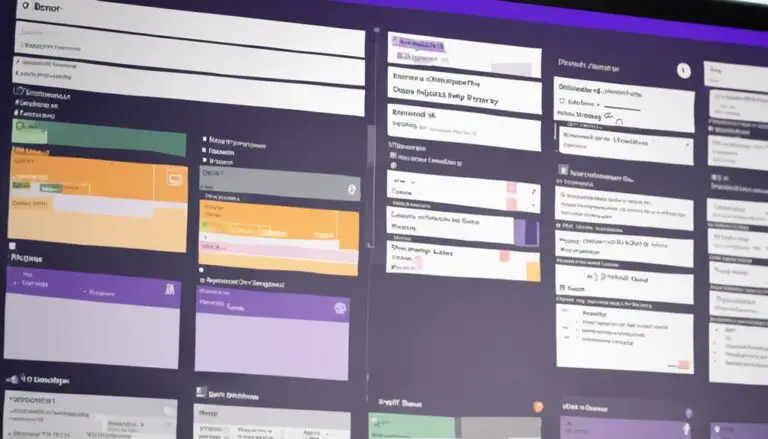Did you know that according to a recent survey, 67% of Kanban teams have reported improved efficiency and workflow visibility since adopting this methodology?
While the role of a Scrum Master is not a prerequisite for Kanban success, their experience can bring valuable insights to your team.
But, before deciding whether to incorporate a Scrum Master into your Kanban process, consider how their guidance may impact your team dynamics and overall performance.
Key Takeaways
- Kanban success can be achieved without a Scrum Master
- Collaboration, WIP limits, and self-organization are crucial in Kanban
- Team efficiency in Kanban relies on visual management and WIP limits
- Agile Coaches can provide guidance to Kanban teams for success
Understanding Kanban and Scrum Differences
To grasp the disparities between Kanban and Scrum effectively, focus on their distinct methodologies and core principles.
Kanban is all about visualizing your work and maximizing efficiency. Unlike Scrum, Kanban doesn't have predefined roles like Scrum Master; it's more flexible and adaptable to changing priorities. In Kanban, there are no specific Scrum teams; instead, it encourages collaboration among all team members. One of the key concepts in Kanban is the use of Work In Progress (WIP) limits, which help teams manage their workload effectively.
Kanban's emphasis on continuous flow contrasts with Scrum's structured sprints. While Scrum is rooted in software development practices, Kanban draws from lean manufacturing principles. Understanding the differences between these methodologies is crucial for determining which approach best suits your team's needs.
The Role of a Scrum Master
As you navigate the realm of Kanban and its unique methodologies, understanding the pivotal role of a Scrum Master is essential for steering your team towards agile success. In Kanban teams, the Scrum Master plays a crucial role in ensuring adherence to agile principles and practices. Here are some key aspects of the Scrum Master's role:
- Supporting Team Effectiveness: Scrum Masters operate at various organizational levels to support the effectiveness of the scrum team.
- Accountability and Leadership: The role of a Scrum Master goes beyond just a title; it involves accountability, leadership, and guiding the team towards success.
- Training and Coaching: Scrum Masters are responsible for training, coaching, and facilitating the team to achieve their goals effectively.
- Similarity to Agile Coaches: Agile Coaches can also provide guidance and support to Kanban teams, similar to the role of a Scrum Master in project management.
Understanding the significance of a Scrum Master in Kanban teams is crucial for maximizing the benefits of agile practices and achieving project success.
Benefits of Having a Scrum Master
Enhancing team efficiency and promoting continuous improvement, a Scrum Master in Kanban environments plays a critical role in ensuring adherence to agile principles. By facilitating sprint planning sessions, they assist in prioritizing tasks from the product backlog and establishing WIP limits on the Kanban board. This guidance ensures a steady flow of work, preventing bottlenecks and promoting a focus on completing tasks efficiently.
Moreover, the Scrum Master's involvement in daily stand-ups and regular retrospectives fosters team collaboration and continuous learning. They coach on best practices, help resolve conflicts, and provide insights into metrics for measuring progress. This support aids in enhancing overall team effectiveness and performance.
With their expertise in agile methodologies, Scrum Masters play a vital role in steering Kanban teams towards success. Their presence leads to streamlined workflow management, improved communication, and a structured approach to achieving goals. Ultimately, having a Scrum Master in a Kanban environment can significantly contribute to the team's success and the successful implementation of agile practices.
Kanban Success Without a Scrum Master
With a focus on self-organizing teams and team ownership, achieving Kanban success without a dedicated Scrum Master is entirely feasible. In Kanban teams, the following strategies can ensure efficiency and effectiveness:
- Empower Team Members: Encourage team members to take ownership of their work and collaborate effectively without the need for a Scrum Master's direct oversight.
- Implement WIP Limits: Utilize WIP limits to manage workflow and improve efficiency, allowing teams to self-regulate and optimize their processes.
- Leverage Kanban Principles: Embrace Kanban principles such as visualizing work, limiting WIP, and continuous improvement to enhance team dynamics and productivity.
- Blend Scrum and Kanban Practices: Blend practices from Scrum and Kanban methodologies to create a customized approach that suits the team's specific needs in software development.
Team Efficiency in Kanban
To optimize team efficiency in Kanban, implementing visual management through a kanban board is essential for tracking progress and identifying bottlenecks. Setting Work In Progress (WIP) limits ensures a smooth workflow, reduces multitasking, and improves overall team efficiency.
Monitoring cycle time and lead time metrics in Kanban helps measure task completion time, pinpointing areas for enhancement and boosting efficiency. Encouraging teams to understand these metrics and adapt processes accordingly fosters continuous improvement over time.
The role of a Kanban master is crucial in guiding teams towards achieving sprint goals and enhancing workflow efficiency. Emphasizing team collaboration, self-organization, and value delivery are core principles of Kanban that contribute significantly to overall team efficiency and success.
Making the Decision for Your Team
When considering the need for a Scrum Master in Kanban teams, assessing the team's expertise, guidance requirements, and commitment to agile practices is crucial. Making the decision for your team involves evaluating several key factors:
- Team's Expertise: Determine if your team has the necessary knowledge and experience to effectively implement Kanban practices without external guidance.
- Guidance Requirements: Consider whether your team could benefit from the support and direction provided by a Scrum Master to navigate the complexities of Kanban effectively.
- Commitment to Agile Practices: Evaluate your team's dedication to embracing agile methodologies and their willingness to adapt to new ways of working.
- Transition Needs: Assess the challenges your team may face during the transition to Kanban and how a Scrum Master could help streamline this process.
Frequently Asked Questions
Are There Required Roles in Kanban?
In Kanban, required roles are flexible, emphasizing team dynamics and self-organization. Lean principles guide Kanban boards for continuous improvement in work in progress. Optional roles like Service Request Manager can be adopted based on team needs.
What Is the Role of Master in Kanban?
In Kanban, the role of a master involves team collaboration and continuous improvement, workflow optimization, visual management, process efficiency, bottleneck identification, task prioritization, cycle time tracking, and embracing lean principles through servant leadership for success.
When Might You Not Need a Scrum Master on a Team?
When your team is autonomous and self-managing, focused on Lean principles like visualizing work and continuous improvement, a Scrum Master might not be needed. Embrace adaptive leadership, trust in established workflows, and effective communication for success.
Do We Really Need Scrum Masters?
You don't "really need" Scrum Masters for Kanban success. In Kanban, team autonomy, self-organization, continuous improvement, lean principles, and a collaborative culture drive progress. Embrace these values collectively to optimize workflow efficiently without a designated Scrum Master. While having a Scrum Master can certainly be beneficial in some environments, Kanban excels in its ability to empower teams to manage themselves. Additionally, the focus on continuous improvement in Kanban means that teams can adapt and evolve their processes without relying on a designated leader. Ultimately, the emphasis on team autonomy and collaboration sets Kanban apart and reduces the need for scrum masters in teams.
Conclusion
In the world of agile methodologies, having a Scrum Master for Kanban success is like having a compass in uncharted waters. While not necessary, their guidance can steer the team towards efficient workflows and continuous improvement.
Just as a compass helps navigate through challenges, a Scrum Master can help Kanban teams stay on course and reach their destination smoothly. Consider the unique needs of your team and decide if a Scrum Master is the right guide for your Kanban journey.





